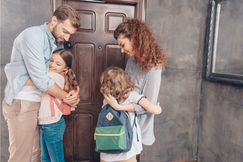What is child sickness benefit and how can I apply for it?
All important information on children's sickness benefit
Due to the Corona pandemic, in 2021 you will be able to claim child sickness benefit not only when your child is ill, but also when your child cannot be looked after in any other way, for example if you cannot get a place in emergency care or your child's school is not open. You can find all the information you need about child sickness benefit in this article.

1. What is child sickness benefit?
Child sickness benefit is available to parents who need to care for their sick child at home and are unable to go to work. In the Corona Pandemic, this will also support working parents if they need or want to care for their child at home during daycare and school closures because they do not want or cannot send them to emergency care. Parents who basically work from home could also apply for child sickness benefit if there is a need for care.
2. Who can claim child sickness benefit?
To claim child sickness benefit, the following conditions must be met
- Parental employment
- Care must be provided at home by the person claiming the child's sickness benefit (not by other persons or in emergency care)
- Children must be under 12
- There is no age restriction for children with disabilities
- The applicant and the child must be covered by statutory health insurance and have a basic entitlement to sickness benefit (this may exclude self-employed persons or freelancers covered by statutory health insurance if they are not entitled to sickness benefit).
Child sickness benefits can be applied for if daycare centres and schools are closed due to the pandemic, if only limited emergency care is offered or if compulsory attendance is suspended and children are in distance learning. Many parents are in home office and cannot ensure parallel care; this is even more true for parents who have to pursue their work "regularly" at the workplace.
3. How many days of child sickness benefit can I claim?
Retroactive to 05.01.2021, children's sickness benefit can be claimed under the following conditions
- Kita/ School is closed
- Due to quarantine there is a ban on visits
- Schools must remain closed
- Classroom teaching is cancelled
- Childcare in Kitas is only available to a limited extent (e.g. emergency care)
- Parents receive the recommendation to care for their children at home
- Certificate of the school/ day care centre
Here are two examples of how many days of children's sickness benefit are available to you.
Two parents
Two parents
In the case of one child, each parent is entitled to 20 days of child sickness benefit. Two parents are accordingly entitled to 40 days of children's sickness benefit.
With two children, the number of children's sick days doubles to 40 days per parent. Two parents have a joint entitlement to 80 days.
If there are three or more children, each parent is entitled to 45 days. Together they are entitled to 90 days.
As a matter of principle, the respective parent for whom the child sick days are requested must provide the care. In certain cases, however, there may be an exception to this (see below).
Single parent
Single parent
With one child, a single parent is entitled to 40 days of child sickness benefit. With two children she is entitled to 80 days and with 3 children the limit of 90 days is reached.
General
90 days is the upper limit, even with more than three children. A further increase is not possible. It should also be borne in mind that the total number of days of sick leave for children relates to the entire calendar year. This means that if one parent now uses up his/her full entitlement (of, for example, 20 days for one child), then for the rest of the year only the other parent can claim and take child sick days. Also, single parents cannot take additional child sick days for 2021 if they exhaust the 40 days (for one child) now.
4. Where can I apply for it?
You submit the application to your health insurance company, in most cases you can submit it online on the website of your health insurance company or by mail. The specific procedure should be regulated as uniformly as possible by the health insurance companies, but this is not yet the case. Otherwise, call your health insurance company for information. They can tell you exactly which documents you need. If there is a shortage of childcare, for example, you might need a certificate from the daycare centre or the school. If your child is ill, you will need a certificate from the paediatrician.
5. How much money do I receive for the children's sick days?
The health insurance fund covers part of the loss of wages, as the employer does not have to pay the wages for these days. However, the reimbursement amount does not correspond to the full net wage, but is lower and ranges from approx. 67 to a maximum of 100 %. However, the maximum limit is 112.88 euros per day.
6. Can children's sick days be transferred to the other parent?
In principle, there is no legal entitlement to transfer the days. However, in consultation with the employer or both employers, it is possible for the parent who has already used up the children's sick days to have them transferred by the other parent.
7. Further regulations
What applies to the self-employed?
Self-employed persons with statutory health insurance are only entitled to sick days for children if they are entitled to sick pay themselves and have submitted a corresponding declaration of election.
What applies to parents in part-time jobs?
By law, each working day is counted as a full day, half days are accordingly not provided for. This is a problem in the legal basis and requires creative solutions between employer and employee, so that the working hours should be flexibly adjusted.
What applies to parents with a mini-job?
A mini-job is a low-paid employment. You are therefore not insured under the statutory insurance scheme with entitlement to sick pay. The entitlement to sick days for children does not apply.
What applies to parents on reduced hours?
If the parent and the child are insured by law, sick leave for children can be claimed. However, short-time allowance and children's sickness allowance may not be drawn at the same time.
References
- Federal Ministry of Health (18.01.2021)
- ZDF article (18.01.2021): Kitas und Schulen im Shutdown. What you need to know about children's sick days.
- Sandra Maria Runge (Specialist Solicitor) (19/01/2021): Instagram post on Corona- Children's sick pay extension.
- Bundesministerium für Familie, Senioren, Frauen und Jugend (27.01.2021): Fragen und Antworten zum Kinderkrankentagen und zu Kinderkrankengeld. (Federal Ministry for Family Affairs, Senior Citizens, Women and Youth).
- Mirror article by Zobel, Hanna (01/28/2021): Corona Children's Sick Days. How to get your money
Published on
Topics
Articles on the topic
-
Chances and child welfare- go for it!
Article from the Süddeutsche Zeitung

-
Job loss, job search and fear of the future
What you can do to get back on track

-
Corona - and then what?
How you can support your teenager with fear of the future

-
Parents between all chairs
Unclear specifications require responsible design

-
Not a romantic relationship, still family!
Experts explain how separated parents get along

-
Not lonely despite Corona
How young and old maintain social contacts even in lockdown
